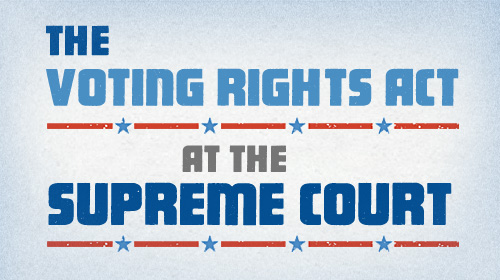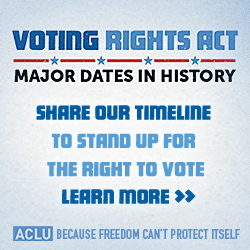
During the signing ceremony of the Voting Rights Act, President Lyndon B. Johnson characterized the law as "one of the most monumental laws in the entire history of American freedom." Since that day, this landmark civil rights law has steadily and surely defeated and deterred countless discriminatory and varied barriers to the ballot.
Under constant review since its passage in 1965, the Voting Rights Act has continued to be found relevant and necessary to protect minority voting rights by the highest courts and lawmakers across the country. In 2006, Congress voted to re-authorize the VRA, extending its authority for the fourth time since its enactment. Before doing so, Congress held 21 hearings, heard from more than 90 witnesses, and compiled more than 15,000 pages of evidence. Support was overwhelming and the message clear; the VRA is still relevant and necessary to protect minority voting rights. Congress renewed it for another 25 years by a vote of 390 to 33 in the House and unanimously in the Senate. And in invoking its authority under both the Fourteenth and Fifteenth Amendments to combat racial discrimination in voting, the D.C. Circuit Court just recently found that Congress had acted at "the apex of its power."

A History of The Voting Rights Act: Check out the Timeline!
When he signed this extension into law, President George W. Bush reminded Americans why we fight so vigorously to preserve the right to vote: "Eighty-one year old Willie Bolden was the grandson of slaves, and in the spring of 1966, he cast his first ballot in Alabama's Democratic primary. He told a reporter, ‘It felt good to me. It made me think I was sort of somebody.'"
Voting matters. Its power lies not only in the practical, in giving people an opportunity to elect candidates of their choosing, but also through the sense of dignity that it gives to those who are able to exercise it. Withholding the right to vote was a reminder to those excluded that they were not whole; they were un-American; they were nobodies. Indeed, throughout our country's history, the right to vote was denied to white men without property, African-Americans, women, Native Americans, Chinese Americans, and adults under twenty-one-years of age.
But that's all history, some claim today, saying that we're no longer plagued by the racial injustice of the civil rights era. Yes, Bull Connor is dead and our nation has elected a black president. But unfortunately, Connor's legacy still lingers in modern day, less overt strategies to block African Americans, Latinos, and other minorities from the ballot.
Why we still need Section 5
Section 5 remains relevant in big ways and small. Throughout the jurisdictions to which Section 5 applies, voting remains divided along racial lines. Congress found that in 2000, only 8 percent of African Americans were elected from districts where white voters comprise the majority. At the same time, no Native Americans or Hispanics had been elected to office from a majority white district.
Knowing this, those in power not only attack the right to vote, but also diminish the value of each vote through all kinds of creative methods, including drawing boundaries of an election district to ensure that minority voters cannot constitute a majority, by "packing" minorities to insure they are a majority in only one or a limited number of districts, and by implementing majority vote and numbered post requirements which maximize the power of the white vote.
Leading up to the 2012 presidential election, politicians attempted to chip away at our fundamental right to vote – and overwhelmingly, people of color were the target. The Department of Justice recently rejected Texas' congressional and senate redistricting plans because the legislature acted deliberately to ignore the dramatic growth in the Hispanic population. After failing to receive preclearance from the DOJ, South Carolina went to court to receive approval for its law to require photo ID for voting. Through the course of the trial, the state agreed to modify the law to comply with Section 5 and insure that it would not have had a disproportionate impact on that state's African-American voters. And the preclearance process helped reshape Florida's early voting period and defeat its restrictions on registration drives.
No less significant was the recent example of a Texas county that attempted to move a polling place from a school to a private club—one which had been historically segregated. After the DOJ sought more information before approving the change, the county withdrew its request.
To beat back this relentless desire to restrict minority voting rights, we need a robust law, one that doesn't just allow piecemeal litigation as a remedy. And Section 5 provides this. Lest you think that all jurisdictions covered under this critical law are chafing under its purview, Mississippi, which has the largest portion of African-American voters of any state in the country, and North Carolina, which has the seventh largest, joined California and New York in voicing their steadfast support of the law. In their amicus brief to the Supreme Court, these states characterized the burdens Section 5 imposes as "minimal" and lauded the provision for helping their states move closer to their "goal of eliminating racial discrimination and inequities in voting."
And jurisdictions that believe Section 5 should no longer apply to them already have a remedy. They can "bail out" from the statute's coverage if they can demonstrate that they've remained free of discriminatory voting laws or policies within the preceding 10 years, have complied with the VRA, and have made efforts to ensure equal access to the ballot. Since 1984, the Attorney General has consented to every bail out application, including New Hampshire's, in December 2012.
Why we fight
The Voting Rights Act remains an indispensable tool in our fight to preserve the right to vote; this law brings us one step closer to our dream of achieving our ideal of true egalitarian citizenship. It must be preserved.
Check out A History of The Voting Rights Act timeline.
Learn more about The Voting Rights Act and other civil liberties issues: Sign up for breaking news alerts, follow us on Twitter, and like us on Facebook.



